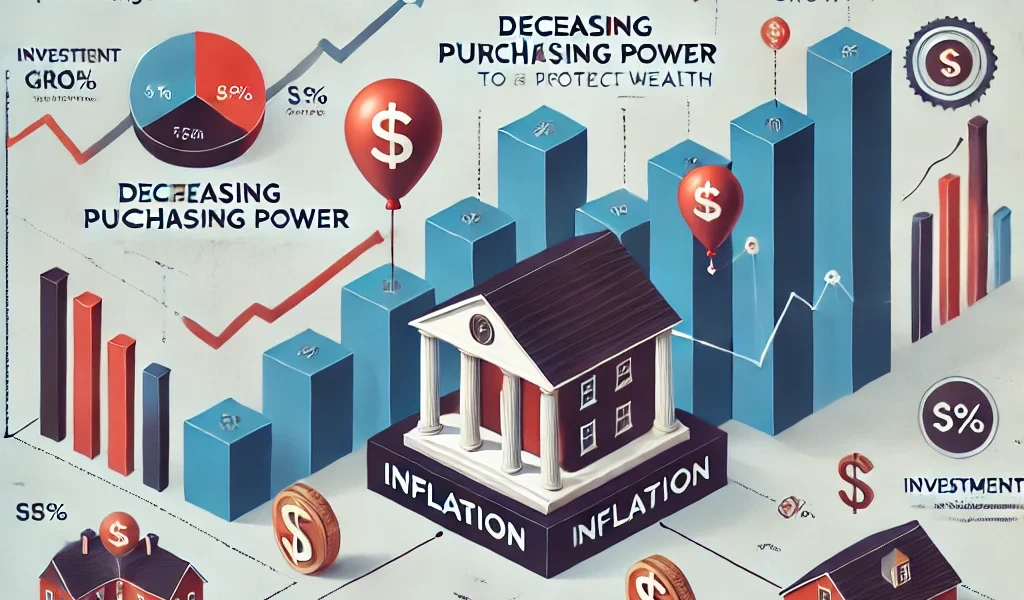Introduction
Inflation is an unavoidable economic phenomenon that affects every aspect of personal finance. As the cost of goods and services rises over time, the purchasing power of money declines, reducing its real value. If left unchecked, inflation can erode savings, lower investment returns, and make it more challenging to meet financial goals.
Understanding inflation and implementing strategies to protect your wealth is essential for financial security. In this guide, we will explore what inflation is, how it impacts your money, and the best ways to safeguard your financial future.
1. What is Inflation?
Inflation refers to the rate at which the general level of prices for goods and services increases over a period of time. It is measured using indexes such as:
- Consumer Price Index (CPI): Tracks changes in the prices of everyday consumer goods.
- Producer Price Index (PPI): Measures changes in the prices producers receive for their goods.
- Core Inflation: Excludes volatile food and energy prices for a clearer picture of long-term inflation trends.
Causes of Inflation:
- Demand-Pull Inflation: Occurs when demand for goods and services exceeds supply.
- Cost-Push Inflation: Happens when production costs (e.g., wages, raw materials) rise, leading to higher prices.
- Monetary Policy & Money Supply: An increase in money supply without corresponding economic growth can devalue currency, causing inflation.
2. How Inflation Affects Your Money
Inflation can have a significant impact on personal finances in various ways:
1. Erosion of Purchasing Power
As prices rise, your money buys fewer goods and services, reducing your overall standard of living.
2. Decreased Value of Savings
If your savings are sitting in a low-interest savings account, inflation may outpace the interest earned, effectively reducing your wealth.
3. Lower Real Investment Returns
Inflation diminishes the real return on investments. For example, if your investment yields 6% but inflation is 3%, your real return is only 3%.
4. Rising Cost of Living
Everything from groceries to housing becomes more expensive, making financial planning crucial for maintaining a stable lifestyle.
3. How to Protect Your Money from Inflation
To prevent inflation from eroding your wealth, consider these financial strategies:
1. Invest in Inflation-Protected Securities
- Treasury Inflation-Protected Securities (TIPS): These government bonds adjust for inflation, ensuring your investment maintains purchasing power.
- Series I Bonds: Designed to protect against inflation by offering an interest rate that includes a fixed and inflation-adjusted component.
2. Diversify Investments
Investing in a diversified portfolio can help hedge against inflation.
- Stocks & Equities: Historically, the stock market has outpaced inflation over the long term.
- Real Estate: Property values and rental income often rise with inflation.
- Commodities (Gold, Silver, Oil): Hard assets tend to retain value during inflationary periods.
- Cryptocurrencies & Alternative Investments: While volatile, some investors view crypto as a hedge against inflation.
3. Consider High-Yield Savings Accounts & CDs
- Keep emergency funds in high-yield savings accounts or certificates of deposit (CDs) with competitive interest rates.
- Look for financial institutions that offer inflation-beating interest rates.
4. Increase Income Streams
- Invest in skills or education to improve earning potential.
- Explore passive income opportunities like dividends, rental income, or side businesses.
- Negotiate salary increases that account for inflation.
5. Reduce Debt Smartly
- Focus on paying off high-interest debt (credit cards, personal loans) as quickly as possible.
- Fixed-rate debt (such as mortgages) can be beneficial, as inflation reduces the real cost of repayment over time.
6. Adjust Spending & Budgeting Habits
- Use budgeting tools to track expenses and identify areas to cut costs.
- Prioritize essential expenses and avoid unnecessary luxury spending.
- Take advantage of discounts, bulk purchases, and cashback rewards to mitigate rising costs.
7. Stay Updated on Economic Trends
- Monitor inflation rates and adjust financial strategies accordingly.
- Work with a financial advisor to optimize your investment and saving strategies.
- Be prepared to adapt as economic conditions change.
Conclusion
Inflation is a financial reality that impacts everyone, but with the right strategies, you can protect your wealth and maintain financial stability. By diversifying investments, utilizing inflation-protected assets, and adopting smart financial habits, you can safeguard your purchasing power and ensure your money continues to grow over time.



